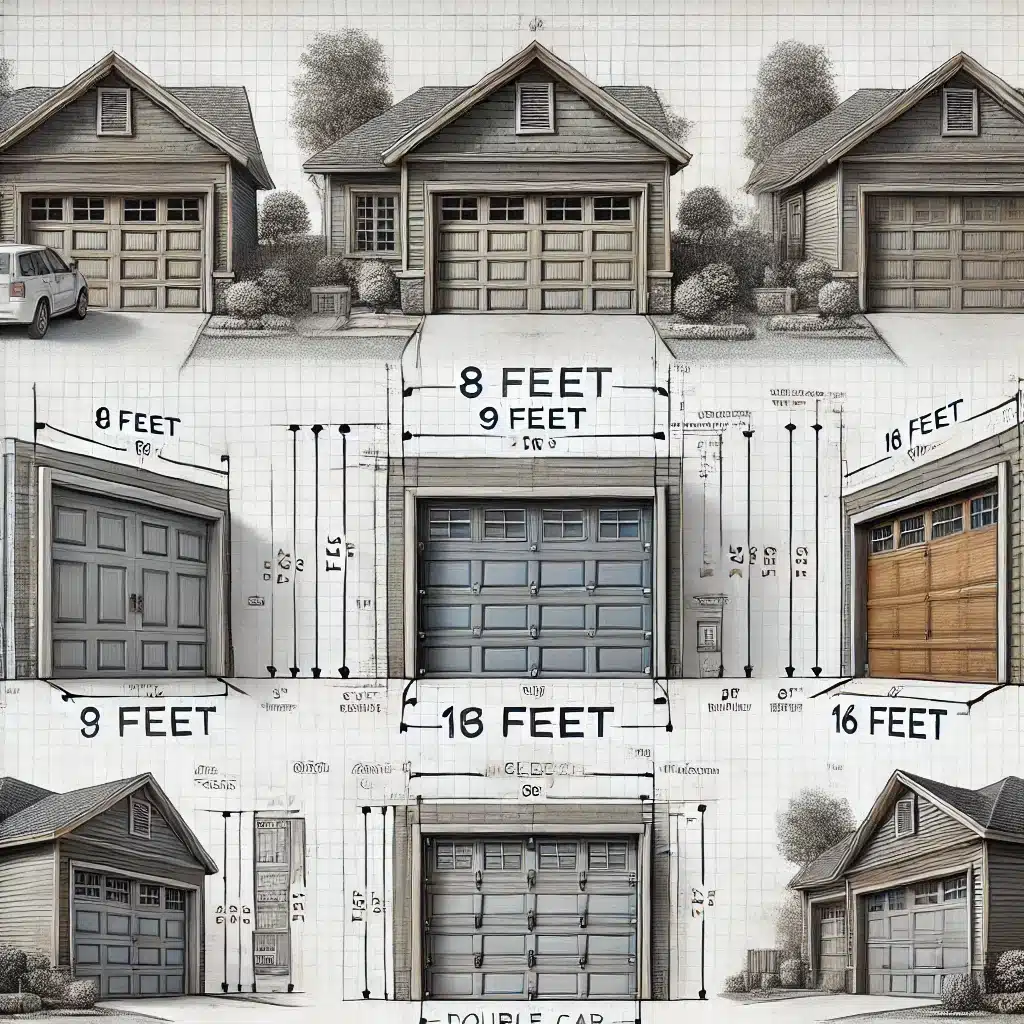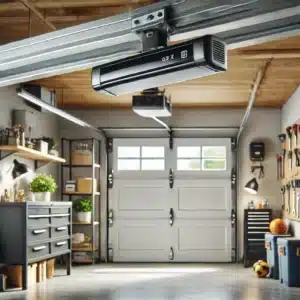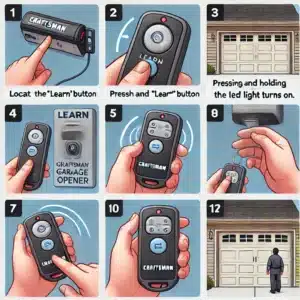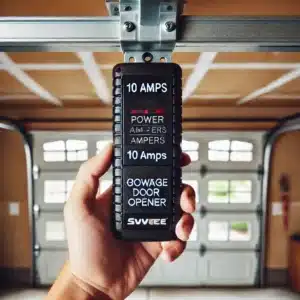When it comes to selecting the perfect garage door, one of the most critical factors to consider is the garage door width. Homeowners often overlook this detail, focusing instead on aesthetics or material, but getting the width right is essential for both functionality and design. Whether you’re building a new garage or replacing an old door, choosing the correct width ensures your garage is practical, safe, and accessible for all your needs.
In this detailed guide, we’ll walk you through the most common mistakes homeowners make when selecting a garage door width, helping you avoid these pitfalls. By the end of this article, you’ll have the knowledge to confidently choose the right size for your garage, ensuring a smooth installation and long-term satisfaction.
Why Garage Door Width Matters
Vehicle Accommodation
The garage door width directly influences how well your garage serves its primary purpose—housing your vehicles. Here’s how different scenarios highlight the importance of choosing the right width:
- Compact and Midsize Cars: For smaller vehicles, a narrower door might suffice, but it leaves little room for error when driving in and out. A slightly wider door can alleviate the risk of scrapes and dents.
- Large Vehicles and SUVs: These vehicles require wider doors. A standard single-car garage door might be too narrow for a large SUV or a pickup truck, making it difficult to enter and exit the garage without damage.
- Multiple Vehicles: If you own more than one vehicle, the width of your garage door becomes even more critical. A double-car garage door must be wide enough to accommodate both vehicles comfortably, allowing for easy access and enough space to avoid collisions.
Storage and Accessibility
Garages often double as storage areas, holding everything from bikes and lawnmowers to large tools and seasonal decorations. Here’s how the right garage door width can make a difference:
- Ease of Access: A wider door can make it easier to move large items in and out of your garage. This is particularly important for items like lawnmowers, bicycles, and motorcycles, which might be used frequently and need more space to maneuver.
- Functional Storage: With the right door width, you can store your vehicles alongside your belongings without the space feeling cramped or cluttered. This layout efficiency prevents the hassle of moving multiple items just to access one.
- Safety and Convenience: Proper door width reduces the risk of damage to both your vehicle and stored items by providing enough clearance. This setup enhances safety, as tight spaces can increase the likelihood of slips, trips, and falls, especially when carrying heavy or awkward items.
Enhancing Property Value
An appropriately sized garage door also plays a role in maintaining or increasing your property’s value. A garage that can comfortably fit vehicles and storage items is a major plus for potential buyers, who may view a cramped or poorly accessible garage as a significant disadvantage.
The width of your garage door has a substantial impact on the functionality of your garage space. It determines the ease of vehicle accommodation, the efficiency of using the garage as a storage space, and overall safety and convenience. When choosing a garage door, it’s important to consider both present and future needs to ensure the space works well for all intended purposes.
Common Mistakes to Avoid When Choosing Garage Door Width
1. Not Measuring Correctly
One of the biggest mistakes homeowners make is failing to accurately measure their garage door opening before selecting a new door. This oversight can lead to significant issues down the line, including a door that’s too small or too large for the space.
How to Avoid It: Measure the width of your garage opening at least twice before making a purchase. Be sure to account for any obstructions like pipes, wiring, or structural supports that could interfere with the door’s operation. It’s always better to double-check measurements than to realize the door doesn’t fit after installation.
2. Ignoring Future Needs
Many homeowners choose a garage door width based on their current vehicle or storage needs, but they fail to consider how their requirements might change in the future. For example, if you plan to upgrade to a larger vehicle, or if your family is growing and you anticipate needing more storage space, a narrow garage door might not suffice down the road.
How to Avoid It: Think long-term when choosing a garage door width. If you’re considering purchasing an SUV, truck, or larger vehicle in the future, opt for a wider garage door now to avoid the hassle and expense of replacing it later.
3. Not Considering a Two-Car Garage Door Option
Some homeowners have two separate single-car garage doors, but this setup can sometimes create logistical challenges. If you have two vehicles, you may find that a single, wider door for both cars provides more convenience, allowing for easier parking and better use of garage space.
How to Avoid It: If you have a two-car garage, consider opting for a double garage door that spans the full width. A standard double garage door is typically 16 feet wide, making it easier to park two cars side by side without the hassle of maneuvering through narrow doors.
4. Overlooking Clearance and Height Requirements
When focusing on garage door width, many homeowners forget to consider how door width interacts with the overall height of the garage. Vehicles like trucks, vans, and SUVs often require more vertical clearance, and if you only focus on width, you might end up with a door that is too low for your vehicle.
How to Avoid It: Along with width, measure the height of your garage opening and the clearance needed for your specific vehicle. Make sure there’s enough room to open and close the door without hitting any obstructions.
5. Skipping Professional Advice
Garage doors are a significant investment, and choosing the wrong width can lead to costly mistakes. Many homeowners opt for a DIY approach to save money, but this can backfire if they don’t consult a professional garage door repair expert who understands the complexities of garage door sizing.
How to Avoid It: Before making a final decision, consult with a garage door expert or installer. They can provide advice on the best garage door width for your specific garage setup and ensure that you avoid mistakes that could lead to additional costs or frustration.
Standard Garage Door Width Options
When selecting a garage door, consider the size that best fits your vehicle and garage space. Here’s a more detailed guide to help you understand the standard and custom options available for garage door widths.
Single-Car Garage Door Widths
Single-car garage doors typically come in three standard widths:
- 8 feet: This is the smallest standard width available and is most suitable for compact cars. It offers a snug fit and maximizes space in smaller garages.
- 9 feet: This width is the most commonly selected size for single-car garages. It accommodates standard sedans and small SUVs comfortably, providing a balance between ease of parking and efficient use of space.
- 10 feet: Preferred by those who own larger vehicles such as full-sized SUVs or desire more room to maneuver. This size reduces the risks of scratches and makes it easier to get in and out of the vehicle.
Double-Car Garage Door Widths
Double-car garage doors are designed to accommodate two vehicles and come in two primary widths:
- 16 feet: This width is the standard for double-car garages and is adequate for most cars to park side by side without feeling cramped. It allows for easy access and minimal clearance issues.
- 18 feet: Homeowners with larger vehicles or those who appreciate extra space for easier movement might choose an 18-foot-wide door. This option provides more breathing room between cars and can facilitate the storage of bicycles, tools, and other equipment along the garage walls.
Custom Garage Door Widths
For those with specific needs that standard sizes cannot meet, custom garage door widths are an excellent solution. Custom sizes can be tailored for several situations:
- Specialty Vehicles: If you own a larger vehicle like an RV, boat, or commercial truck, a custom garage door width can ensure that your vehicle fits without any hassles.
- Unique Garage Layouts: Homes with unusually shaped garages might need a custom door to accommodate architectural details or specific design elements.
- Aesthetic Preferences: Custom doors can also be designed to match your home’s aesthetic or architectural style more closely, providing a seamless look.
Custom garage doors offer flexibility but typically come at a higher cost and may require more time for manufacturing and installation. When deciding, consider the size of your vehicles and the garage’s internal dimensions.
5 Common FAQs About Garage Door Width
1. What is the standard width of a single-car garage door?
The typical width for a single-car garage door is 9 feet, which comfortably accommodates most standard-sized cars and small SUVs. However, narrower options at 8 feet are available, suitable for compact cars and tight spaces. For those needing extra room, perhaps for larger vehicles or easier maneuverability, doors can extend up to 10 feet wide.
2. How wide should a garage door be for two cars?
For a two-car garage, the standard door width is 16 feet. This size allows two vehicles to park side by side without risk of damage from opening doors or moving around the garage. Homeowners who have larger vehicles or want more clearance space may opt for an 18-foot-wide door, which provides additional room for easier access and movement within the garage.
3. Can I replace two single-car garage doors with one double garage door?
Yes, it is possible to replace two single-car garage doors with one double garage door. This modification often enhances the functionality and aesthetics of your garage, creating a single, wide entrance that makes it easier to park larger vehicles and reduces the architectural segmentation of your garage facade. It also potentially increases the usability of the garage space by eliminating the central pillar between the two smaller doors.
4. What should I consider when choosing a custom garage door width?
When opting for a custom garage door width, consider several factors:
- Vehicle Size: Ensure the door will accommodate all current and potentially larger future vehicles.
- Storage Needs: Factor in whether you’ll store other large items, like boats or work equipment, which might require extra space.
- Usage Plans: Consider any multi-functional uses of the garage space, such as workshops, gyms, or hobby areas, which might benefit from more width.
- Professional Advice: Consulting with a professional installer can provide insights into the feasibility and structural implications of custom widths for your garage.
5. Can garage door width affect energy efficiency?
The width of a garage door can indeed influence energy efficiency, particularly in garages attached to the home. Wider doors have a larger surface area that can lead to greater heat loss in winter and heat gain in summer, especially if not properly insulated. Selecting an insulated door, regardless of size, is crucial if maintaining an energy-efficient home is a priority. Proper installation and weather stripping are also essential to minimize energy loss.
Conclusion
Selecting the right garage door width is essential for both functionality and convenience. By avoiding the common mistakes outlined in this guide, you can ensure that your new garage door provides the necessary clearance for your vehicle, offers easy access, and meets your long-term needs.
Whether you need help measuring, selecting, or installing the perfect garage door, Family Prestige Garage Doors is here to help. Our expert team provides high-quality installation and repair services, ensuring your garage door works smoothly for years to come.
End Note
Family Prestige Garage Doors is your trusted partner for all your garage door needs. We offer high-quality services designed to protect your home and boost curb appeal with tailored solutions. Learn more about our expertise on our About Us page, and explore the variety of Garage Door Services we provide. Discover the areas we cover by visiting our Service Areas section, and find flexible payment options through our Financing page. For inspiration and project ideas, take a look at our Gallery and stay informed by browsing our Blog. If you’re ready to start your project, feel free to Contact Us today!





